11 simple habits to help you sleep soundly at night
Regular sex, good eating habits, and more can lead to better sleep.
Updated on September 30, 2024
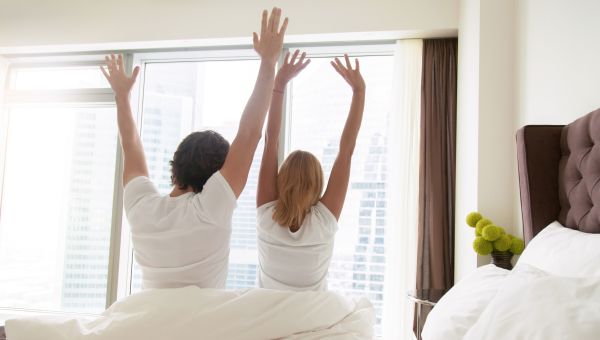
When you’re tossing and turning at 3 a.m., it may feel like you’re never going to get to sleep. But you may have more control over your sleep than you think.
From the time you have your last sip of coffee, to the number of meals you eat throughout the day, adopting and maintaining certain habits can help you wind down at night and get a healthy seven hours or more of quality sleep.
From Christopher Morgan, MD, a neurologist and sleep specialist in Grand Rapids, Michigan, here are 11 strategies to get restful slumber.
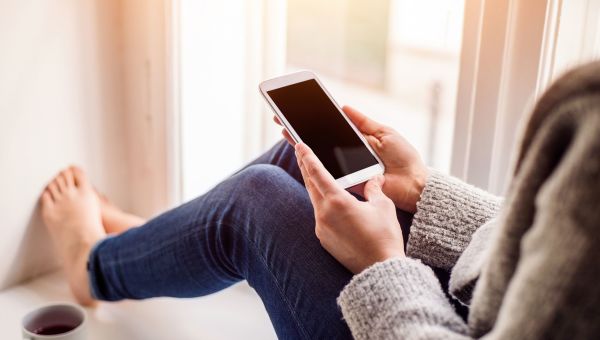
Track your sleep
The same way tracking your daily meals can help you achieve weight loss goals, keeping track of your sleep habits may help you get better sleep.
Many sleep experts recommend that their patients keep a diary of both their sleep patterns and the lifestyle habits that affect sleep. Some of the most important things to track include:
- How many hours you slept
- Any disturbances or disruptions that caused you to wake up in the night
- How you felt the next day (tired? energized?)
- How much caffeine or alcohol you consumed
- The medications you took
- Any exercise you performed
When journaling about your sleep habits, be as specific as possible to help you and your healthcare provider (HCP) notice patterns and come up with a treatment plan. You may even start to notice problem areas on your own and brainstorm ways to improve. Bring your sleep journal to appointments with your primary physician and specialists—it’s best for all of your HCPs to be aware of your sleeping patterns.
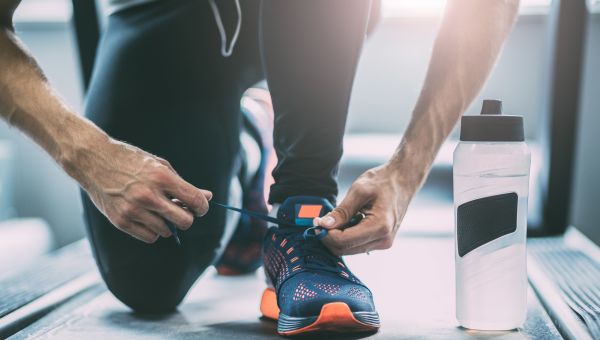
Break a sweat
Getting exercise can help you feel more alert during the day and can also help you sleep better at night. The Centers for Disease Control and Prevention recommends that adults should strive for 150 minutes of moderate activity or 75 minutes of vigorous exercise each week, and the more physically active you are, the better. Getting closer to 300 minutes of moderate exercise or 150 minutes of more strenuous activity on a weekly basis provides even greater health benefits.
Keep in mind that any amount of exercise is better than none and will help reduce your risk for many chronic health issues, like heart disease and diabetes. Even a two-minute walk counts toward your weekly physical activity goals.
To sleep soundly, set a goal to exercise three to five days a week, and avoid intense exercise at least two hours before bed. Light exercise like walking may be okay before bed, but strenuous workouts like cycling, running, or weightlifting could keep the body stimulated, making it harder to go to sleep, says Dr. Morgan.
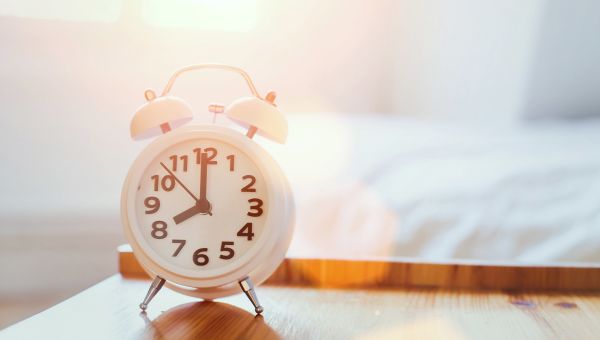
Stick to a sleep schedule
Waking up and going to sleep at the same time every day—even on weekends—is key to getting good-quality sleep. “If you get up at 5 a.m. for work on the weekdays, you should try not to sleep in too much later than that on the weekends,” says Morgan.
Sticking to a schedule helps regulate your body clock, so you can fall asleep at a certain time—and stay asleep once you do hit the hay. If you’re having trouble waking up at the same time each morning, try putting your alarm clock on the other side of your bedroom so you have to get up to turn it off.

Eat regular meals throughout the day
Just as a sleep and wake schedule can help you get more slumber, eating regular meals throughout the day can help, too. “Every system in our body has its own clock, so the more we can play into those body clocks, the better our body is going to function, and the better our body is going to be programmed to go to sleep at the right time,” says Morgan.
He recommends eating breakfast, lunch, and dinner at about the same times every day in order to help your digestive system get used to processing foods at those times. If this is difficult, try setting phone alarms or marking your calendar to help you remember.
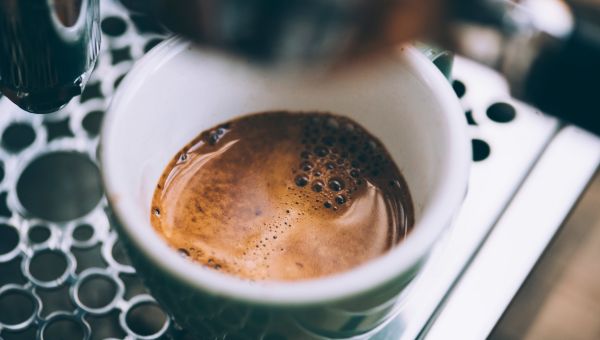
Take it easy on the espresso
That morning cup of joe can block chemicals causing sleepiness and increase adrenaline production. So, while an a.m. pick-me-up is okay, downing lots of soda or coffee throughout the day is likely to interfere with sleep later on.
Even though caffeine doesn’t affect everyone the same way, it's still a stimulant that can prevent your brain from achieving deeper levels of sleep, says Morgan. “There are people who are slow metabolizers of caffeine and there are people who are quick metabolizers.” Caffeine can also make sleep disorders like restless legs syndrome worse.
If you love that cup of coffee, Morgan recommends nixing it six to eight hours before bedtime. One 2023 review published in the journal Sleep Medicine Reviews concluded that coffee shouldn’t be consumed for nearly nine hours before sleep, and pre-workout supplements containing caffeine shouldn’t be taken less than 13.2 hours before lights out.
Watch out for tea and chocolate—they contain low amounts of caffeine, too. Try limiting your caffeine intake to a total of 250 milligrams a day. That’s about three 8-ounce cups of coffee.
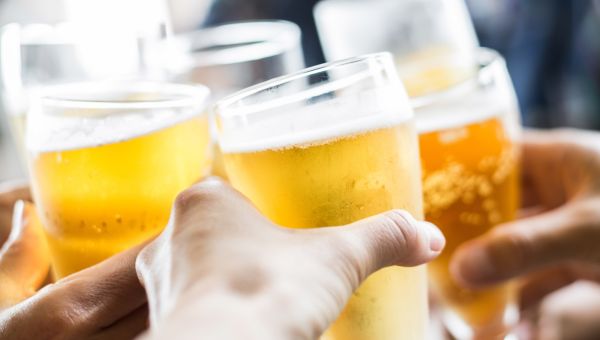
Skip that second drink at happy hour
It may seem like alcohol helps you fall into a deep sleep—and it will for a few hours because it’s a depressant—but for the second half of the night, you’re probably going to toss and turn. “When the alcohol wears off, you have a mini withdrawal syndrome, and your brain gets overstimulated, causing you to have disrupted sleep the second half of the night and wake up before you’re rested,” says Morgan.
Never use alcohol to try to fall asleep: “People who don’t have control over their alcohol or have insomnia try to self-medicate themselves with alcohol,” Morgan says. Alcohol also blocks rapid eye movement (REM) sleep, the type of sleep that allows your brain to process information from the day so that it can be stored in your long-term memory. If you don't get enough REM sleep, you’re likely to wake up feeling tired and less alert. Alcohol can also cause breathing problems like snoring and sleep apnea and may make you go to the bathroom more often.
If you do drink, stick to moderate intake of alcohol—that means one drink per day for women and two for men—and enjoy them earlier in the evening.
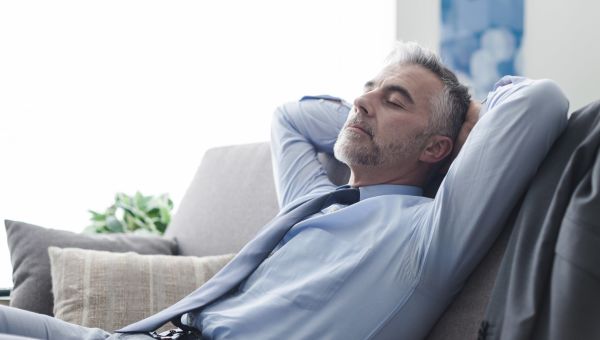
Limit mid-day naps
Naps may sound good at the time, but long siestas can disrupt your sleep later on. On the other hand, quick naps may not be so bad if you’ve slept poorly the night before. If done correctly, power napping can increase your alertness, put you in a better mood, and may be less likely to interfere with your nighttime sleep patterns. Just be sure to limit your nap to no longer than 30 minutes. “If you sleep any longer than that, you may get into a deep sleep, feel groggy, and have more trouble waking up,” says Morgan.
If you are going to power nap, be sure your room is cool and dark so you can fall asleep more easily. The best hours to nap are between 1 and 3 p.m., since that tends to be when your blood sugar and energy levels naturally drop. If you are having trouble sleeping at night, you may want to avoid naps altogether, though. While short power naps may help you make it through the day, avoiding them could help you sleep better.
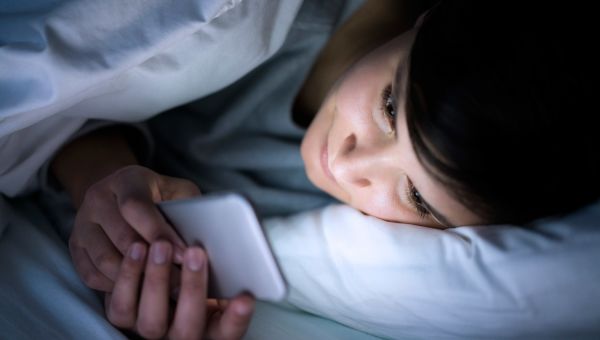
Reduce the use of technology
Some technology may be good for your health, but overdoing it before bed can keep you awake. Looking through your social media feeds as you’re trying to wind down for sleep keeps your mind racing, which prevents you from being able to relax.
That's not all: The blue light from TVs, tablets, and phones is thought to suppress melatonin, the hormone that regulates your sleep and wake cycle. You normally start producing melatonin two to three hours before turning in for the night. “So when you’re using electronics an hour before bedtime, it’s going to make it harder for your body to naturally get into the rhythm of going to bed,” says Morgan. If you have your phone on your nightstand, dings from texts, calls, or emails may wake you, as well.
It’s okay to want to wind down at night with your favorite TV show or smartphone app. Just be sure you set aside all gadgets at least an hour before bedtime or keep electronics out of the bedroom so you’re not tempted. That means your TV, too.
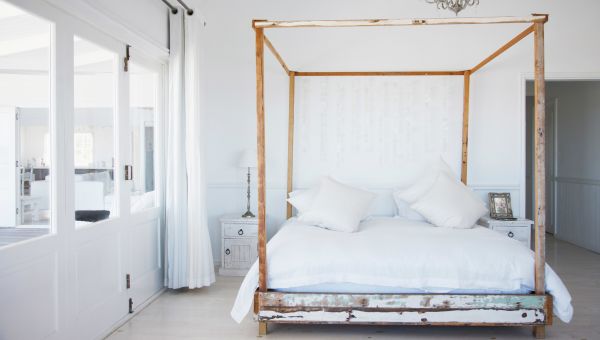
Make sure your bedroom is just for sleeping—and sex
If you’re hanging out in your bedroom for reasons other than sleeping and having sex, you should reconsider.
Why? “It’s important to distinguish your bedroom as a place to sleep, otherwise it’s hard for your body to realize the signals,” says Morgan. A lot of people with insomnia or other sleeping problems are so used to being awake in bed that their brain can’t relax there anymore, he adds.
“Try and make sure that you’re not doing anything in bed besides sleeping or having sex. And if you're not sleeping, get out of bed and go to another room until you feel sleepy again.”
Keep your bedroom cool—between 60 and 67 degrees Fahrenheit is best—and make sure it's dark and free of any noise.
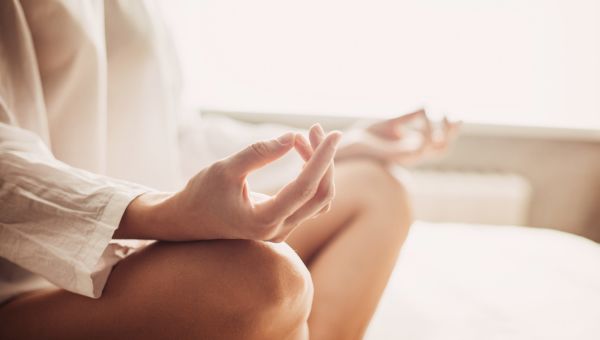
Experiment with relaxation techniques
You’re going to fall asleep faster—and get better sleep—if both your mind and body are at ease. Mindfulness activities help you relax and detach from worries and other thoughts that keep you up at night. You can learn many of these practices online, says Morgan. Here are some mindfulness techniques to try:
- Progressive muscle relaxation: Tense and relax the muscles in your toes, and then slowly work your way to your head and neck. Try tensing for five seconds and then relaxing for 30 seconds. Repeat a few times.
- Guided imagery therapy: Close your eyes and think of a scene or memory that comforts you, like looking out over the ocean or sitting outside reading a book. Slowly think through and visualize every detail of the moment, and if your mind wanders, recognize it, then gently bring your attention back to your visualization.
- Breathing exercises: Close your eyes and start to take notice of your breath. Pay attention to the way the air passes in and out of your nose or mouth and through the rest of your body. Release any tension, and if other thoughts come into your mind, direct your focus back to your breathing.
- Mindfulness meditation: Sit in an upright posture and pay attention to the sensations in your body. You may notice things like your breath or the floor underneath you. Focus your mind and if it wanders to other things, bring your attention back to your body.
Start with five minutes and gradually work your way up to the duration that feels right for you. If you need additional help, try talking to a sleep specialist.
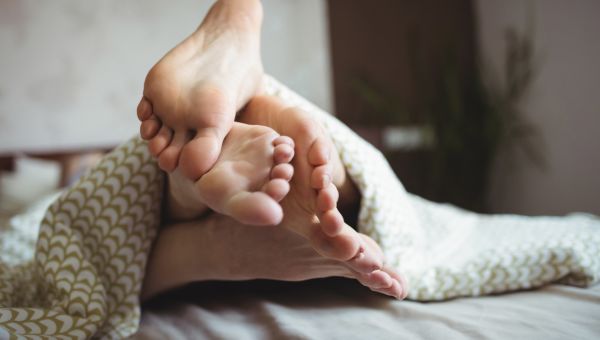
Have sex
Healthy relationships can lower levels of the stress hormone cortisol, and lower stress levels can help you relax. Having sex can release the hormone oxytocin, making you feel more connected to your partner. And sex may have benefits for sleep, too.
While this area of study needs more research, both a 2019 study in the journal Frontiers in Public Health and a 2023 study published in the Journal of Sleep Research found that orgasm is the most helpful element of a sexual experience as far as being a sleep aid.
If you’re having trouble finding the time for sex, schedule it on your calendar. And if you’re lying in bed and your head is spinning with thoughts from the day, try initiating sex with your partner (or yourself) instead of dwelling on those thoughts.

Centers for Disease Control and Prevention. About Sleep. Page accessed September 30, 2024.
Centers for Disease Control and Prevention. Adult Activity: An Overview. Page accessed September 30, 2024.
Cleveland Clinic. How Exercise Affects Your Sleep. November 11, 2020.
Alnawwar MA, Alraddadi MI, Algethmi RA, et al. The Effect of Physical Activity on Sleep Quality and Sleep Disorder: A Systematic Review. Cureus. 2023 Aug 16;15(8):e43595.
American Academy of Sleep Medicine. Healthy Sleep Habits. Page last updated August 2020.
U.S. Food & Drug Administration. Spilling the Beans: How Much Caffeine is Too Much? Page last updated August 28, 2024.
Gardiner C, Weakley J, Burke LM, et al. The effect of caffeine on subsequent sleep: A systematic review and meta-analysis. Sleep Med Rev. 2023 Jun;69:101764.
Sharp, Amelia. Alcohol and Insomnia: How Alcohol Affects Sleep. American Addiction Centers. Page last updated June 18, 2024.
Centers for Disease Control and Prevention. About Moderate Alcohol Use. Page accessed September 30, 2024.
Centers for Disease Control and Prevention. NIOSH Training for Nurses on Shift Work and Long Work Hours: Nap Duration. Page accessed September 30, 2024.
Mayo Clinic. Napping: Dos and don'ts for healthy adults. November 9, 2022.
Cleveland Clinic. Why You Should Ditch Your Phone Before Bed. May 20, 2022.
Cleveland Clinic. What’s the Best Temperature for Sleep? November 15, 2021.
Mayo Clinic. Relaxation techniques: Try these steps to reduce stress. January 24, 2024.
Oesterling CF, Borg C, Juhola E, Lancel M. The influence of sexual activity on sleep: A diary study. J Sleep Res. 2023 Aug;32(4):e13814.
Cleveland Clinic. Cortisol. Page last reviewed December 10, 2021.
Cleveland Clinic. Oxytocin. Page last reviewed March 27, 2022.
Lastella M, O'Mullan C, Paterson JL, et al. Sex and Sleep: Perceptions of Sex as a Sleep Promoting Behavior in the General Adult Population. Front Public Health. 2019 Mar 4;7:33.
Oesterling CF, Borg C, Juhola E, et al. The influence of sexual activity on sleep: A diary study. J Sleep Res. 2023 Aug;32(4):e13814.
More On


video
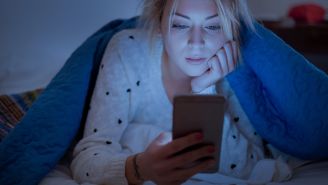
article

slideshow


video


video
